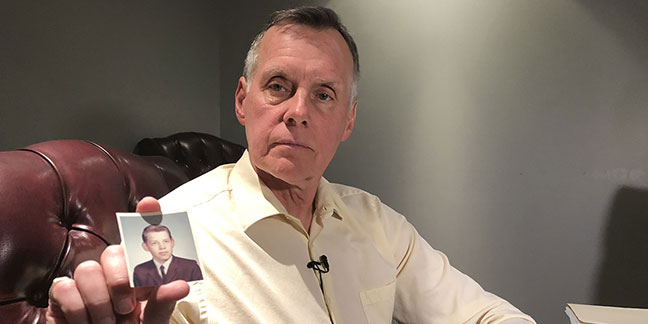 Rick Lober of Asheville has recounted his experience of being abused by a priest when he was a teenager growing up in New York. (David Hains | Catholic News Herald) ASHEVILLE — Motivated by his own childhood trauma, Rick Lober is getting involved in the Church’s response to child sexual abuse.
Rick Lober of Asheville has recounted his experience of being abused by a priest when he was a teenager growing up in New York. (David Hains | Catholic News Herald) ASHEVILLE — Motivated by his own childhood trauma, Rick Lober is getting involved in the Church’s response to child sexual abuse.
In 1969 Lober was a high school junior, living in New York and thinking of a religious vocation, when his physics teacher, a priest, started paying extra attention to him. For Lober, who grew up without a father, the adult male attention was welcomed. “I was like, wow!, a priest reaching out to me,” recalls Lober, who now lives in Asheville and attends St. Eugene Church.
The attentiveness from the priest included time spent in conversation after classes at St. Pius X Preparatory High School in Uniondale, N.Y., special projects and even an overnight trip to Washington, D.C., Lober says.
Alone in a confessional with the priest, Lober, who describes himself at that time as “sexually naïve,” confessed to a sexual sin. Lober found himself being groomed, and a series of sexual encounters between the man and the boy followed, he recounts.
The priest “basically manipulated me in a way in which I felt like this is what I needed to do if I was going to be saved,” Lober explains.
After six months Lober had enough, and he cut off contact with the priest. He buried the memory of his trauma, as he puts it, “in a deep and dark place.” After a year in a college seminary, he dropped out of school and angrily abandoned his Catholic faith. “Once I realized more fully what he had done to me and how he abused me…I hated him,” Lober describes.
The school was closed in 1984. Lober himself did not tell anyone of the abuse until just last year – long after he had married, raised a family and returned to the Church.
The priest is not being named by the Catholic News Herald because he has not been publicly reported by his diocese, the Diocese of Rockville Centre, N.Y.
Lober says the New York diocese does not plan an investigation into the matter because the priest died in 1988.
Sean Dolan, communications director for the Diocese of Rockville Centre, declined to comment before presstime, saying, “There are a lot of moving parts that need to be adequately researched.”
It was last August’s news of the Pennsylvania grand jury report, detailing hundreds of cases of clergy sexual abuse involving more than a thousand victims, that brought back all of the painful memories, Lober says.
Like much of the nation at the time, Lober’s parish was abuzz with the details of the report and what it meant. Father Patrick Cahill, St. Eugene’s pastor, held a meeting for parishioners to discuss the scandal, and hundreds of people showed up. Near the end of the meeting, Lober says, he felt compelled to speak up.
He recalls, “I was shaking like a leaf, my voice quivered… This was the first time I ever (publicly) shared my story.”
He described being groomed and victimized, and his testimony shocked the room into silence. His witness also spurred parishioners to organize a parish response to abuse. Father Cahill formed a Child and Youth Protection Committee that will review the procedures for reporting sexual abuse in the parish and develop materials to assist parents in talking to children and young people about sexual abuse awareness. Lober heads the committee.
Lober later shared his testimony with Bishop Peter Jugis, explaining that his committee wanted to work on meaningful reforms and changes at the parish, regional and diocesan levels. “We’re not here as an adversary, we are here to help,” he says he told the bishop, adding, “I came out of that meeting with a sense of joy… I saw in him a genuine openness.”
Lober, who is semi-retired, now spends much of his time talking about and planning the next steps for the laity as it works from within to make lasting change in the Church.
In a statement to the Catholic News Herald, Bishop Jugis said, “We appreciate the courage and contributions Rick Lober is making to keep children safe and to educate everyone about how they can get involved to help bring positive change within the Church. The Church regrets the pain Rick experienced as a result of his association in New York with a priest who should have been there to protect and guide him. In Charlotte, we are committed to rooting out and stopping sexual abuse and sexual misconduct of any kind.”
— David Hains, Director of Communication
Warning signs of abuse in minors
- No longer wants to see a particular person they had been close to
- Has declining academic performance
- Tries to hide use of technology
- Is no longer interested in activities they used to enjoy
- Shows changes in personality
- Demonstrates aggressive behavior or is constantly angry
- Withdraws from family or friends
Warning signs of perpetrators
- Tries to get minors alone
- Commits physical and emotional boundary violations
- Keeps secrets with minors
- Gives lavish gifts to minors
- Allows or encourages minors to break laws or rules
- Is overly interested in spending time with minors
- Has inappropriate or suggestive conversations with minors
- Does not believe the rules apply to them (or, does not follow rules or protocols)
— U.S. Conference of Catholic Bishops


